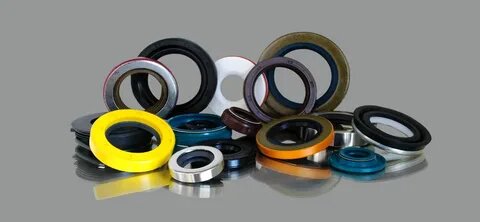Oil seals are rotational shaft seals that fill a gap between fixed and moving components, preventing lubricant from escaping and preventing contamination. Oil seals come in various shapes, sizes, and materials to suit different applications and environments. The application and medium used with the oil seal will decide the proper material and kind of oil seal.
Oil seals are used in various applications, including household appliances, automotive and power plant gear, industrial pumps, gas and aviation turbines, and compressors. This blog will therefore discuss different types of oil seals and everything you need to know about them.
Essential Things you should know About Oil Seals
Oil seals are critical to assembling all rotating and moving parts. They operate as a physical barrier to keep lubricants in a while, keeping dirt, moisture, and other contaminants out. They are available in various sizes and specifications to satisfy multiple demanding sealing applications in various industries. This two-part article highlights some of the most important facts concerning oil seals. Continue reading to learn more about seals!
General Features of Oil Seals
Oil seals are designed to provide the best possible sealing performance, even at high peripheral speeds. They're small, light, and have an excellent self-lubricating performance. Because oil seals are made of high-quality materials, they endure a long time without displaying hardening, softening, or aging symptoms.
A conventional oil seal comprises an external circular metal disk and an inside flexible rubber disk vulcanised to the metal. There are no slack pieces on the bonded seal that may enable oil to escape or pollutants to enter. This kind of seal is more precise and may fit into a tiny place with ease.
Types of Oil Seals
Oil seals come in a variety of styles to best suit the applications. In India, oil seal manufacturers use current polymeric seal materials and depend on their knowledge of the sealing mechanisms at the sealing contact while constructing oil seals. As a result, they will supply you with dependable oil seals while also improving environmental protection. Oil seals are available in the following varieties:
- Type A rubber-coated single lip with spring
- Type ADL rubber-coated double lip with spring
- Type AO rubber-coated single lip – no spring
- AODL double-lip type
- Single metal lip-metal enclosure with spring, Type B
- Double lip type BDL
- Metal casing, type BO single lip
- Metal case with double lip type BODL
- Type C complete single metal lip case with spring
Oil Seal Applications
Agriculture, automotive, construction, material handling, mining, oil and gas, and other industries use oil seals extensively. They are also used in the construction of Conveyors and Elevators.
- Engines
- Pipelines and Grinding Mills
- Turbines (Wind)
The performance of these seals is heavily reliant on maintaining an appropriate unit load at the seal-shaft contact. These seals can tolerate pressures of up to 15 PSI, and their performance is determined by shaft diameter, shaft speed, operating temperature, and service circumstances. However, before using these seals, it is essential to consult oil seal manufacturers in India.

Comments
Post a Comment